Greetings! ScoreKeeper here chiseling my way through concrete collections of copious film music compilations in search of ten worthy opuses to adorn my list crowning the best scores of 2009.
I have to admit that it was unusually difficult this year to amass a list of film scores I felt passionately enough about to cultivate my favorite ten. I don't think 2009 will be remembered as a particularly banner year for film music. Amidst all the fluff and blubber there does exist a couple handfuls of gems which will forever rank among my perennial favorites; however, the numbers are not nearly prolific enough to remedy the current pedestrian pandemic afflicting film music today.
The scores that made my list this year, and the few that barely missed, are certainly representative of my enduring hope, passion, and enthusiasm for this amazing craft and I'm honored to spotlight them here.
I'm a little late to the party so let's get to it!
T-minus ten and counting…


10. UNDER THE MOUNTAIN (2009) by Victoria Kelly – If you are not yet familiar with Movie Score Media, you certainly should be. A relative newcomer to the high-risk low-stakes game of film music recordings, MSM has quietly risen through the ranks of soundtrack labels to become one of the elite global giants of the industry. Movie Score Media is the Independent Film Channel or college radio station of film music. You may not have ever heard of the films they release scores from nor the composer who penned them; however, one after another, each release is a treasure to adore and cherish.
In 2009 I was introduced, through Movie Score Media, to two new composers whose jaw-dropping work departed upon me the resolute conviction that superior film music can often arise from unexpected origins. The first of the pair is Victoria Kelly.
New Zealand native Victoria Kelly's score for UNDER THE MOUNTAIN is an eclectic meld of subterranean adventure, harrowing defeatism, beguiling beauty, and sensual tenderness all expressed with acrobatic ease through inventive orchestration. This is a dark score founded upon the rich traditions of the Golden Age of film music where masterful composers such as Max Steiner, Alfred Newman, Franz Waxman, or Miklós Rózsa, would dare audiences into their world and deliver a cinematic joie de vivre brimming with skilled artistry and superior intellect. With the rampant proliferation of one-trick pony film scores and their rapid devolution into vapid additions to the scrapheap, Kelly offers a robust musical centerpiece displaying an enormous degree of compositional prowess and fortitude.
The score for UNDER THE MOUNTAIN was released on CD by Movie Score Media (MMS09029) and is available for purchase at Sreen Archives Entertainment. It is also available as a digital download via iTunes.
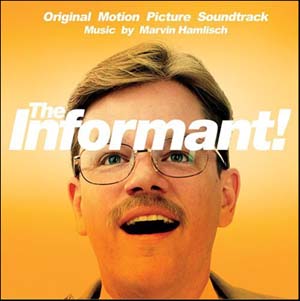
9. THE INFORMANT! (2009) by Marvin Hamlisch – There's no denying my penchant for dramatic scoring. If you wrench my heart with your music, you will stake a tiny claim upon it. Likewise, if you tickle my funny bone, you will conceivably achieve a similar result.
To understand the sheer brilliance of Marvin Hamlisch's score for THE INFORMANT!, one must deconstruct the two major aspects of it which make it successful. The first, and perhaps most obvious, is the music itself. Like colorful square fabric swaths, each telling a different part of the story, Hamlisch stitches together a massive musical quilt stuffing it with lounge piano, baritone saxophone, flutes, whistlers, kazoos, and a Hammond organ jacked into a Leslie rotating speaker.
Hamlisch binds the disparate musical pastiches together by keeping them all stupidly simple. A pair of two distinct "happy-go-lucky" themes, representative of the bipolar mind of the main character, Mark Whitacre (Matt Damon), is interspersed with shadowy retro spy music mortared with heaping ladles of unapologetic lounge piano. To describe it seems ludicrous. To listen is bliss.
If you were to only ever hear the score divorced from its narrative companion, you would certainly never realize the full potential of its genius. It's not solely the music, but the narrative context within the film that ultimately earns its commendation. There's a slightly disconcerting gawkiness which grips you upon first experiencing the jocular tone of the music which dutifully reveals aspects of the character not immediately expressed in the narrative. So many modern film scores refuse to function beyond the obvious. Music is a unique ingredient allowing filmmakers to convey various aspects of their story not clearly defined by other means. Hamlisch's score for THE INFORMANT! is a quintessential model for the functionality of independent layers of "read-between-the-lines" film music.
To read my interview with Marvin Hamlisch click here.
The score for THE INFORMANT! was released by New Line Records as a CD-R and is available through Amazon.com. It is also available as a digital download via iTunes.
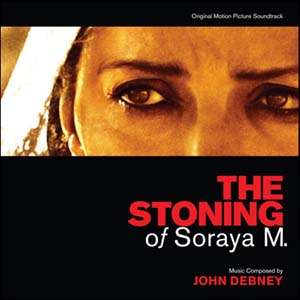
8. THE STONING OF SORAYA M. (2008) by John Debney – When I interviewed John Debney about his score for THE STONING OF SORAYA M. back in July, one of the aspects that I touched on was his ability to create an astonishingly refreshing ethnic score while employing almost every ethnic cliché in the book. He admitted it was a daunting challenge to harvest oft heard ethnic ingredients into music which transcends the stereotypical stigmas attached to them.
"Impossible" is the word I might have chosen.
The fact that the film is based on true accounts helps his efforts. The story, based on the book by Freidoune Sahebjam, chronicles the plight of Soraya M. who, in the mid-1980's, was wrongfully accused of adultery by her husband, buried in the ground up to her waist, and subsequently stoned to death. Deep Iranian roots paired with a usurping clash of cultural classicism by modern western influence warrant Debney's approach; however, his success is not predicated merely on the affirmation of the narrative.
Debney's gnawingly tender score for THE STONING OF SORAYA M. is an allegorical exercise revealing the synergistic forces between creativity and craftsmanship and their collective power to impenetrate triteness. The whole music, in this case, far surpasses the sum of its parts. In this score you'll hear a litany of Middle Eastern percussion, arhythmic solo cello and violin passages, a wailing female vocalise, and several other wind and string instruments indicative of the region. These instruments and sounds are so familiar to the casual cinematic enthusiast that they are no longer regarded as exotic.
Despite the exhaustive use of these elements in other cinematic works by other composers, Debney commits courageously to them and skillfully combines these ingredients to create one of the most beautiful and haunting scores of the year. It is neither pretentious nor condescending; in fact, it's the blatant honesty expressed in the music which makes it so affective. Debney exhibits a genuine gift in expressing heaps of emotion upon his audience without ever coming across as being maladroit or heavy-handed. It's a paramount skill that most composers desperately lust for but ultimately lack the courage to pursue.
The score for THE STONING OF SORAYA M. was released as a limited edition CD (1000 copies) by Varèse Sarabande (302 064 201 2) and is currently out-of-print. Copies are available through Amazon.com. It is also available as a digital download via iTunes.

7. THE RED CANVAS (2009) by James Peterson – Throughout the year, my acutely tuned radar is engaged in a persistent hunt for exceptional new film music. I'm steadfastly diligent in my investigations into the annual contributions of all the titanic names in the industry. Yet it's becoming fairly predictable now that these sources are not always reliable for turning up the well-crafted film scores I crave.
So why should it continue to surprise me when a composer eclipses my radar and appears from seemingly nowhere to drop a musical atomic bomb square between my ears?
James Peterson's raucous yet delicately balanced score for THE RED CANVAS is like a dozen hypodermic shots of vitamin B injected straight into your bloodstream. The rush of awe that sweeps through you upon your maiden listen is both immediate and impressive. Demonstrating his near-masterful command of the orchestra, Peterson's compositional and aural-narrative skills are freakishly apparent with each advancing measure. From the stomp-and-awe avalanche of "Grease Monkey Brawl" to the heart-wrenchingly fragile string ensemble scoring of "Maria Cries," the musical journey I experience while listening is truly one of those inimitable adventures I relish.
The word "craft" is so casually tossed about like a shuttlecock the utter weight and implication of its meaning is inadvertently lost. I would like to rejuvenate and revitalize this word using James Peterson's score for THE RED CANVAS as an exemplar of the consequence of craft.
The score for THE RED CANVAS was released on CD by Movie Score Media (MMS09025) and is available for purchase at Sreen Archives Entertainment. It is also available as a digital download via iTunes.
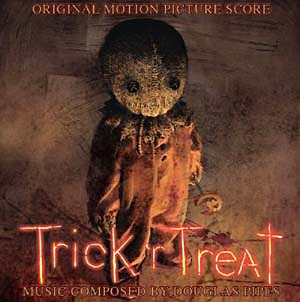
6. TRICK 'R TREAT (2008) by Douglas Pipes – I first saw TRICK 'R TREAT in December of 2007
and was immediately beguiled by its hex. When the film was shelved for two years I was left stranded wanting to share my enthusiasm for a film and a score that nobody could watch nor hear. Finally in October of 2009, the film was released on DVD and Blu-ray. I briskly dusted off my stockpiled memories and recharged my admiration for what stands to be the epitome of cinematic Halloween treats.
Douglas Pipes is one of the few talents to hit the scoring scene in recent years who supercharged my passion for film music with one solitary splendiferous score. In 2006, his music for MONSTER HOUSE, which I enthusiastically reviewed and placed in my top ten list that year, was another bomb dropped by a stealthy composer of whom I had no prior knowledge. With lofty expectations I waited with baited ears for his next film score to hit theaters.
Like a well-composed melody, Pipes' score for TRICK 'R TREAT is the perfect consequent phrase to the antecedence of MONSTER HOUSE. The later of the two masterworks casts an impressive net over Halloween and manages to snare a comprehensive cornucopia of colors, tones, sights, emotions, and flavors embodying and emboldening the very nucleus of Halloween.
Pipes' nuanced execution of the score is evident in his near constant manipulation and development of the "Trick or treat, Smell my feet" rhyme children gleefully chant annually in October. Its ubiquity is skillfully masked by Pipes who refrains from stating it in its purest expositional form anywhere in the score. You feel its unremitting presence within the context of the film without ever being subjugated by it. This is one of the many facets of Pipes' masterful scoring skills which separates him from the humdrum Hollywood rank-and-file.
My ears eagerly await his next endeavor.
The score for TRICK 'R TREAT was released on CD by La-La Land Records (LLLCD 1103) and is available for purchase at Sreen Archives Entertainment. It is also available as a digital download via iTunes.
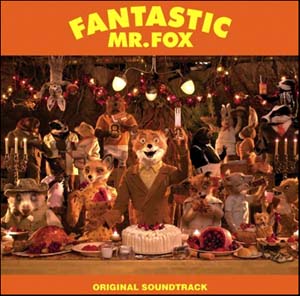
5. FANTASTIC MR. FOX (2009) by Alexandre Desplat – It was an unfathomably busy year for two-time Academy Award® nominee Alexandre Desplat who composed music for seven films released in 2009. In addition to FANTASTIC MR. FOX, Desplat scribed scores for CHÉRI, COCO AVANT CHANEL, UN PROPHÉTE, L'ARMÉE DU CRIME, JULIE & JULIA, and THE TWILIGHT SAGA: NEW MOON. All of these scores deserve attention and accolade for their exceptional quality and skill; however, one particularly odd little score stood out from its mellifluous brethren.
In truth, Desplat's music for FANTASTIC MR. FOX is an underdog woefully outnumbered by its competition. The year was chock-full of bloated orchestral scores each dueling the other to become louder, faster, muddier, and noisier than the one preceding it. Always the engine and never the caboose, Desplat wove together the muted plunk-plunk of a couple notes on the banjo in counterpoint with a twang of Jew's harp and a meek toot on the recorder.
Perhaps I'm oversimplifying it a bit, but the fact remains that the score for FANTASTIC MR. FOX is one of the smallest and simplest I've come across in recent memory. Desplat's hillbilly-infused homage to Morricone is playfully sarcastic, juvenile, rudimentary, and callow. Yet, he managed a coup of the status quo by accomplishing a feat not routinely achieved by other composers...a flawless marriage between film and music.
Sporting an oeuvre most composers would eat mud to duplicate, Alexandre Desplat continues to rise through the ranks as one the premiere global trendsetters of the film music industry. Although my own personal tastes rank him a step or two behind his widespread popularity, his impeccable mastery of FANTASTIC MR. FOX will single-handedly crown him as one of the elite composers working in cinema today.
The score for FANTASTIC MR. FOX was released on CD by Abkco (1877102562) and is available for purchase at Amazon.com. It is also available as a digital download via iTunes.
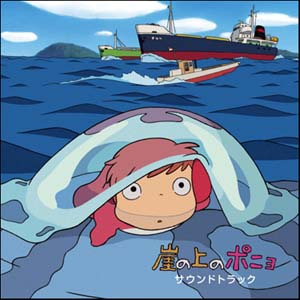
4. PONYO (2008) by Joe Hisaishi – If I were to ask who the greatest director/composer collaborative relationship working in cinema today is, one might proffer the tandems Spielberg and Williams, Burton and Elfman, or perhaps even Abrams and Giacchino. All of them are worthy contenders; however, I would be adamant the conversation include Hayao Miyazaki and Joe Hisaishi.
Released as PONYO ON THE CLIFF BY THE SEA in Japan in July 2008, Hayao Miyazaki's most recent masterwork was introduced to American audiences as PONYO in August 2009. The buzz was that this was the most accessible film Miyazaki had ever produced. With my son in tow, I went to see it opening day expecting to gaze upon a cute little Miyazaki film intended for smaller children.
Whoa! Was I misinformed.
I was absolutely spellbound over the magnitude of beauty, depth of emotion, and charming simplicity of what I consider to be Miyazaki's most alluring film to date. PONYO is defiantly unique from other Miyazaki films. Although it wafts his familiar narrative and visual styles, the story itself is less abstract or surreal than earlier efforts.
Spearheading my bounding fervor for PONYO is an utterly sublime and imposing score by Joe Hisaishi. It is indeed true that the film is a more palatable cinematic experience catered to younger audiences. What separates it from other Miyazaki works is the Herculean effort by Hisaishi to elevate all of the various physical, visual, and emotional components of the story into a massive euphoric avalanche of artistic bliss. This is simply the most prodigious score Hisaishi has ever composed for a Miyazaki film.
More akin to a Straussian tone poem or Wagnerian opera than your typical film score, Hisaishi liberates any semblance of restraint and releases upon a mesmerized audience rich, dynamic, and expertly balanced music crowned with an infectious theme. With paintbrush in hand, he portrays a picturesque topography bathed in the surging bubbles of watery-textured orchestrations while superlatively expressing the tender emotions of the little fish child from the blue sea.
I know I shouldn't be surprised. These two gentleman are unrivaled masters of their craft.
Yeah, my vote goes to Miyazaki and Hisaishi.
The score for PONYO was released on CD by Tokuma Japan Communications (TKCA-73340) and is available for purchase at Amazon.com. It is not currently available on iTunes in the United States.
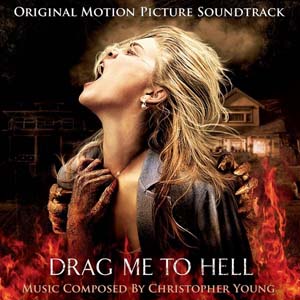
3. DRAG ME TO HELL (2009) by Christopher Young – Surrounded by a hoard of grotesquely wholesome film scores, Christopher Young's mutinous music for DRAG ME TO HELL is an unadulterated celebration of the jollification of evil. No one invites demonic wickedness to the party quite like the poisoned pencil of Chris Young.
One of the most underrated composers in the industry, Young's acute narrative sensibilities are the perfect compliment to Sam Raimi's eclectic amalgam of horror and comedy. From the opening gypsy-esque violin solo to the cacophonic choral uprising of hell's demons upon the earth, Young referees the sinfully playful struggle of evil vs. good with an impartial ear (although, is it just me or do you get the tiny suspicion he's rooting for evil?). Not since Jerry Goldsmith's score for THE OMEN (1976) has the landscape of Hades been painted with such vivid realism you get the sneaking suspicion you've visited its fiery shores a time or two before.
If Raimi was the inventor, Young was his pitchman. A horror mahatma, Chris Young fervently sold Raimi's story and helped deliver one of the purest cinematic joyrides of 2009. I remember sitting in the theater fidgeting in my seat grinning from ear to ear through the entire duration of the movie.
I hope Christopher Young is a man who believes in the power of prayer. When you author the fire and brimstone themes of the underworld as effectively as he did in DRAG ME TO HELL, you may have some explaining to do upon your arrival at the pearly gates. Eternal damnation is no reward for genius.
Or is it?
The score for DRAG ME TO HELL was released on CD by Lakeshore Records (LKS 34091) and is available for purchase at Amazon.com. It is also available as a digital download via iTunes.
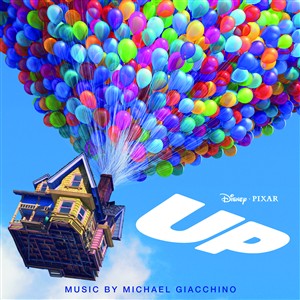
2. UP (2009) by Michael Giacchino – Simply put, UP is a masterpiece. Michael Giacchino is undeniably one of the trailblazing storytellers working in film music today and he's proven it again with another surefire classic.
UP presents itself with a unique array of daunting narrative challenges. For starters, there is the massively inconvenient death of Ellie, Carl's wife, at the conclusion of a lengthy life montage relying solely on Giacchino's music to advance the narrative. How does one put to rest the emotional weight of a short film embedded in the frame of a larger picture? How does a composer pick up those pieces and gain enough momentum to restart the narrative engine after such a tragic distraction? How does one musically express the rejuvenated soul of a degenerating body and whisk them away in tandem on magical adventures half-way around the world? What pieces of the musical puzzle remain to effectively portray a frenetic bird on the verge of extinction, an endearingly annoying young Wilderness Explorer, a pack of embattled talking dogs, and a Zeppelin pilot gone stark raving mad?
There is only one person I know who can unequivocally answer all these boggling questions. Instead of trying to explain it verbally, he just wrote the perfect music to capture it all.
That's the true mark of a great storyteller.
The score for UP was not ever released on CD by Disney (booo!). However, it is available as a digital download via iTunes.
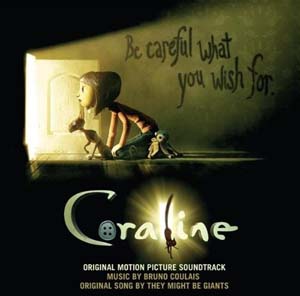
1. CORALINE (2009) by Bruno Coulais – I first saw CORALINE on January 25, 2009. Who would have guessed that a mere few weeks after publishing my article announcing my top ten favorite film scores of 2008, that I would already be experiencing my favorite film score of 2009. I was so enamored by Bruno Coulais' multifarious music for CORALINE that I immediately raced home to write about it.
No matter how marvelous it was, I wouldn't have expected a score heard in January to maintain its luster long enough to endure the onslaught of memorable scores released after it. The bottom line is it wasn't even close. Every year I hope to discover at least one score which transcends the very passion it fuels. When a score reaches this level it exists far beyond the spectrum of mere enjoyment. It becomes a seminal component within the fabric of your spirit. It changes the way you think, the way you feel, the way you hear, see, or touch. It becomes the answer to its own question and forces you to reevaluate the intentions of your passion.
In January of 2009, I was introduced to a score which affected me this way.
CORALINE by Bruno Coulais is my absolute favorite film score of 2009.
The score for CORALINE was released on CD by Koch Records (KOC-CD-4741) and is available for purchase at Amazon.com. It is also available as a digital download via iTunes.
ScoreKeeper!!!











